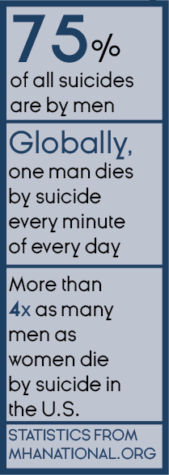Men’s Health Matters
Movement raises awareness for often overlooked problems
Historically, men are expected to portray a certain level of masculinity at all times — this societal structure leads to many struggles with men’s mental health. Masculinity is defined as “qualities or attributes regarded as characteristic of men.”
A classic sign of masculinity is facial hair. During the month of November, many men participate in “No Shave November.” This has led to the naming of November as Men’s Health Awareness Month. The month is for raising awareness about prostate and testicular cancer as well as mental health and suicide prevention for men.
Oftentimes men are told they should not talk about their feelings and that being open about their emotions is a sign of weakness. Movements surrounding men’s mental health aim to create safe spaces that help men come out of their shells and learn to express their emotions in a healthy and productive way. These movements also support men going to the doctor after being told to “tough it out” after experiencing physical ailments.
BV’s school psychologist, Todd McCarthy, had some input on the idea of Men’s Health Awareness Month.
“I’m almost 50 years old; my dad, who I absolutely adored, grew up in that generation where men didn’t have emotions — men didn’t hug, men [were] tough — I don’t have a problem with the tough aspect of it,” McCarthy said. “What I do have a problem with is [how] my dad never went to the dentist [or] the doctor because we just get through it. Something hurts and [you’re] just going to roll with it. You can’t do that.”
On average, globally, one man commits suicide every minute of every day. Roughly 75% of all suicides are by men. There is an ongoing stigma around people seeking out help for their mental problems by going to therapy. This stigma is even stronger surrounding men who go to therapy for their mental illness.
McCarthy had some insight on the men’s mental health crisis.
“Regardless of whether you’re a man or a woman, you have to be able to acknowledge that something’s wrong,” McCarthy said. “If I walk out the door and cut my arm and I’m bleeding, I’m going to go to the doctor and get it fixed. [It’s] the same thing with mental health — if something’s wrong, I need to go get it fixed.”
Throughout November, there was an outpouring of support on social media for men’s health, many of which included a list of things that should be normalized for men, such as showing emotion, asking for help and learning to be vulnerable.

Communication, McCarthy said, is one of the most important aspects of this topic.
“I think it’s incumbent upon people and their families to talk about it,” he said. “I don’t think that’s different than a lot of things that are stigmatized, whether it’s suicide, and I [maintain] that it’s the last big taboo for society to talk about that. That’s where those conversations have to happen. That’s a whole other story — talking about people actually having conversations in our society, which unfortunately happens too rarely anymore.”
One of the biggest goals that the Men’s Health movement is pushing for is to show support for men’s health all year, not just during an awareness month. Their hope is to help men feel able to talk about their emotions and get help for any mental or physical illness they may have.
McCarthy said it’s all about spreading the word about awareness.
“When you have a group of people that look at physical ailments [or] mental ailments as weakness, then finding a way to present information to them that doesn’t invalidate their strength or their own personal perceptions of themselves [is so important], he said. “Word of mouth is going to be the best way to get it done.”

Isaac Hudson is a senior and one of the editors-in-chief this year. It is his fourth year on staff. He is also the president of BV’s Latin Club, and...




